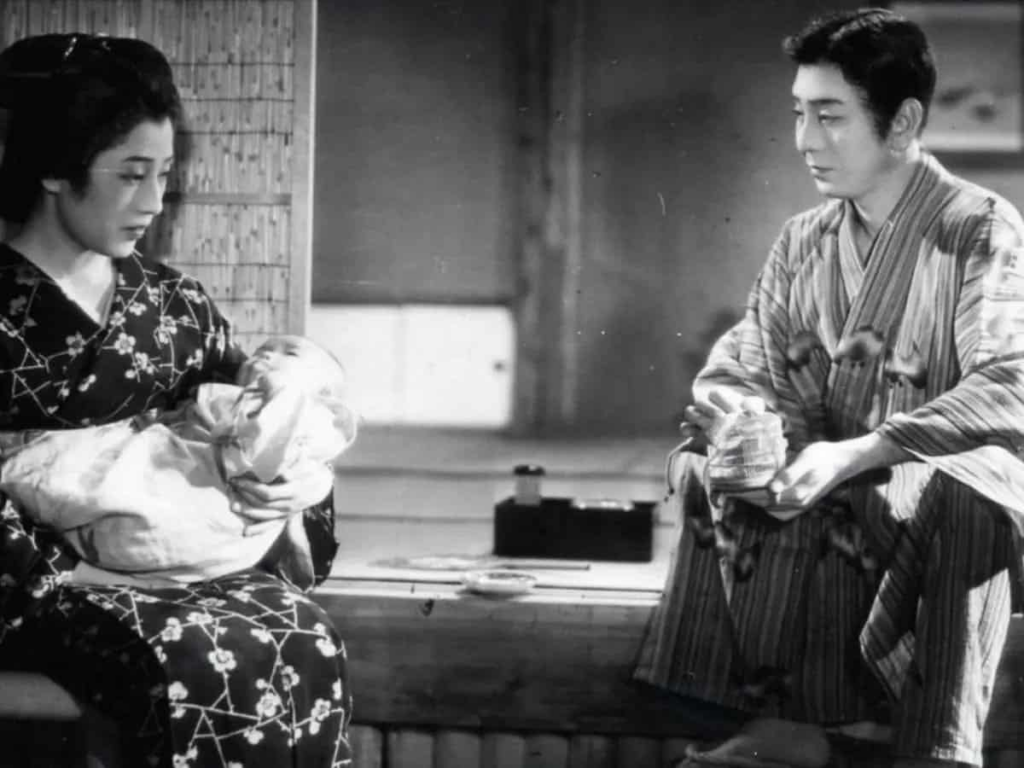
STORY OF THE LAST CHRYSANTHEMUMS, THE (ZANGIKU MONOGATARI) (director: Kenji Mizoguchi; screenwriters: from the novel by Shôfû Muramatsu/Yoshikata Yoda/Matsutarô Kawaguchi; cinematographers: Shigeto Miki/Yozô Fuji; editor: Koshi Kawahigashi; music: Shirô Fukai/Senji Itô; cast: Hanayagi Shōtarō (Kikunosuke Onoue), Takada Kōkichi (Fukusuke Nakamura), Kawarazaki Gonjurō (Kikugoro Onoue), Mori Kakuko (Otoku), Arashi Tokusaburo (Shikan Nakamura), Umemura Yōko (Osata); Runtime: 142; MPAA Rating: NR; producer: Shintarô Shirai; Janus; 1939-Japan-in Japanese with English subtitles)
“Ranks as one of the greatest Japanese films.”
Reviewed by Dennis Schwartz
The great Japanese filmmaker Kenji Mizoguchi(“Sisters of the Gion”/”A Geisha”/”Street of Shame”) was at his peak when filming this great humanistic insight pic. It’s shot in black and white. Mizoguchi gives us a clear vision into the role of women in 19th century Japan. The well-crafted pic, possibly Mizoguchi‘s best, works wonders with long takes and ranks as one of the greatest Japanese films. It’s based on the story by Shôfû Muramatsu and is written by Yoshikata Yoda and Matsutarô Kawaguchi. It’s set in 1885, in Tokyo.
Kibuki actor Kikunosuke Onoue (Hanayagi Shōtarō) is the son of the famous Kibuki actor Kikugoro Onoue (Kawarazaki Gonjurō), but has limited success onstage because he does not follow his father’s example in acting and discipline. Despondent about his lack of success, Kikunosuke finds comfort talking with his baby brother’s servant nurse Otoku (Mori Kakuko), who doesn’t hold back honestly critiquing her master’s acting. Because Kikunosuke spends too much time with the nurse, she’s fired by his father. Kikunosuke then gets up the nerve to leave his privileged life and comfortable home and he marries the servant against his family’s wishes. While enduring poverty in another town, the actor refines his craft with his wife’s assistance and self-sacrifices and eventually, after much suffering, becomes a successful actor on his own merits and without needing to use the prestige of his family name.
It’s a haunting story that shows the ill-effects of social class discrimination and how women are viewed as second-class citizens.
REVIEWED ON 6/29/2013 GRADE: A
© ALL RIGHTS RESERVED DENNIS SCHWARTZ